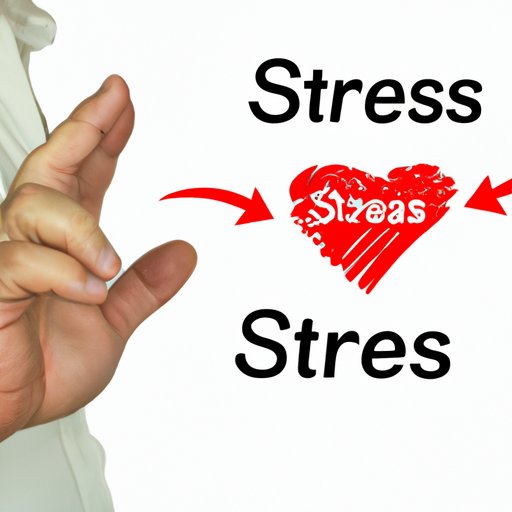
I. Introduction
Stress is a normal part of modern life, but when left unmanaged, it can become a significant risk factor for heart disease. In this article, we will explore the link between stress and heart attacks, discussing the science behind the connection and providing tips for reducing your risk.
II. The Link Between Chronic Stress and Heart Attacks
Chronic stress causes the body to produce cortisol – a hormone that can cause inflammation, damage blood vessels and increase the risk of heart disease. Scientific evidence confirms that chronic stress and the associated cortisol production increase the risk of heart attacks.
According to a 2015 study published in the Journal of the American Heart Association, stress – especially work-related stress – could contribute to a 38% higher risk of coronary heart disease.
III. The Hidden Dangers of Stress
When stress levels are consistently high, it can lead to various physical and psychological consequences, such as raised blood pressure, anxiety, and insomnia.
Elevated cortisol levels caused by stress can cause inflammation throughout your body, which can damage your blood vessels, and ultimately lead to heart attacks and strokes. Furthermore, high levels of cortisol have been associated with metabolic disorders such as obesity, type 2 diabetes, and high cholesterol, all of which are known risk factors for heart disease.
IV. Coping with Stress to Reduce Your Risk of Heart Disease
Stress can never be entirely avoided, but there are ways to manage chronic stress effectively. Here are some useful tips:
- Exercise: Regular physical activity such as walking, cycling, and swimming have been shown to reduce stress levels and lower the risk of heart disease.
- Mindfulness practices: Techniques like meditation, yoga, and deep breathing exercises have all been proven to lower cortisol levels and reduce stress.
- Self-care: Engaging in activities that positively distract your mind such as reading a book, getting a massage, or listening to calming music can significantly lower stress levels.
- Get enough sleep: A restful night’s sleep allows your body to manage stress effectively.
V. The Role of Stress in Heart Attacks
There are several myths and misconceptions surrounding the link between stress and heart attacks. However, scientific evidence recognizes the role of stress as a contributing risk factor in developing heart disease.
A 2018 research published by the National Institute of Health found a strong connection between chronic mental stress and the immediate risk of having a heart attack. According to the research, people with higher levels of chronic mental stress had a higher risk of heart attack, even when controlling for other factors.
VI. From Work to Personal Life: The Impact of Different Types of Stress on Heart Health
Stress can arise from various sources in our lives. Work-related stress is one of the most common, and it can have adverse effects on our heart health. However, personal stressors like divorce, the loss of a loved one, or financial worries can also take a toll.
A recent study published in the European Heart Journal found that experiencing stressful life events could double the risk of heart attacks in the following year.
VII. Conclusion
Chronic stress is a risk factor for heart disease and can lead to adverse physical and psychological effects. However, taking regular measures to reduce stress levels through yoga, mindfulness practices, exercise, and self-care can significantly reduce the risk of heart disease.
By understanding the root causes of stress, we can successfully circumvent its negative effects on our overall health and live longer, healthier lives.




